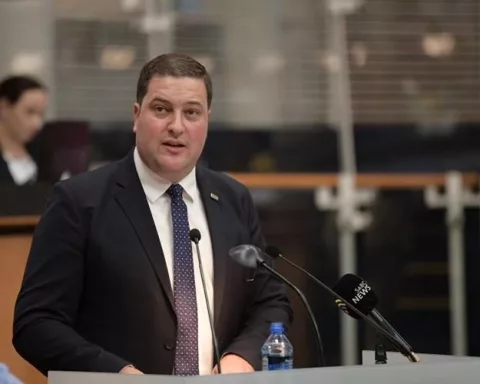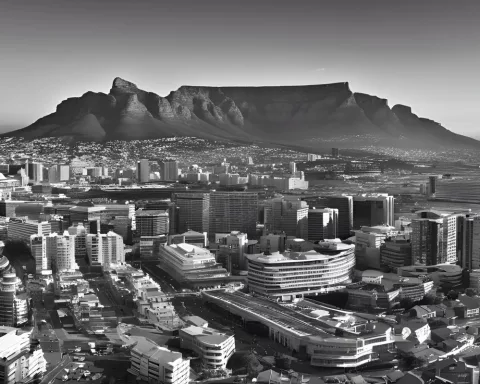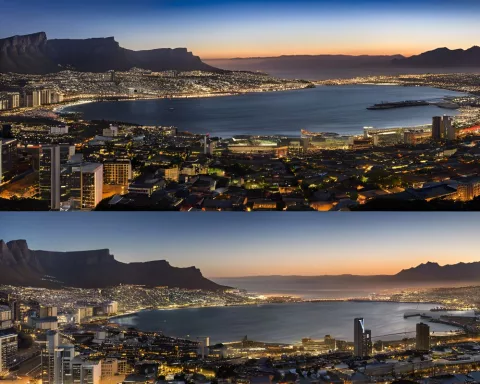Cape Town’s council has allocated a massive R39.5 billion for initiatives that directly benefit low-income households, with a focus on affordable housing and environmental resilience. This forward-thinking infrastructure plan is double that of Durban’s and 80% larger than Johannesburg’s. The city is also celebrating its sports stars while marking new milestones in infrastructure investment, with a dedication to transparency, efficiency, and commitment to growth. The Mayor and Council have set ambitious goals, and Cape Town eagerly anticipates witnessing the fruition of these plans.
What is Cape Town’s infrastructure plan?
Cape Town’s council has implemented the Adjustment Budget, allocating a staggering R39.5 billion for the ongoing three-year medium-term framework. Approximately 75% of this budget is allocated for initiatives that will directly benefit the city’s low-income households. The council aims to improve the lives of low-income households with affordable housing and environmental resilience.
Positioned at the southernmost part of Africa, Cape Town, renowned for its stunning landscapes, has started to step outside of the confines of its natural allure, recording remarkable feats in infrastructure investment. On the dawn of August 22, 2024, the city’s governing body convened, waiting for a potentially transformative discourse.
The Mayor, embodying the spirit of optimism and resolve, initiated the conversation by praising the accomplishments of South African sports stars. In a country that feeds off the energy of sports, the victories of the Springboks, Proteas, and UFC Champion Dricus du Plessis ignited a sense of supremacy and invulnerability in every citizen. The Mayor declared that the same spirit propels the Council’s objective of enhancing Cape Town’s infrastructure.
Shaping The Future: The Council’s Resolution
With the onset of another fiscal year, the City Council voted in favor of implementing the Adjustment Budget, affirming the forward-thinking plan for Cape Town. A surge of expectancy swept across the room as the Mayor presented the capital expenditure report for the previous fiscal year. With a remarkable execution of over 90% of a historic capital budget of R10.5 billion, the council’s mettle and dedication were palpable.
Following a round of applause, the Mayor recognized the most performing departments. Corporate Services, Human Settlements, and Safety and Security were applauded for their exceptional budget utilization, indicative of a committed and efficient administration. The council’s Billion Club, departments handling significant budgets and large-scale projects, comprised Water and Sanitation, Energy, and Urban Mobility. The Mayor extolled the Energy department for their commendable budget expenditure of 94.25%. These departments, tasked with managing budgets exceeding R1 billion, form the core foundation of Cape Town’s infrastructure growth.
The Council’s Ambitious Goals: A Look into the Infrastructure Budget
The Mayor emphasized the significance of high budget expenditures, with yearly increases reflecting the council’s ambitious objectives. The infrastructure budget, a staggering R39.5 billion for the ongoing three-year medium-term framework, is approximately 80% larger than Johannesburg’s and almost double Durban’s. A considerable 75% of this massive budget is allocated for initiatives that will directly benefit the city’s low-income households.
The Mayor envisioned the council’s plan to sync Cape Town’s distribution of grants and equitable share with the latest census data, underscoring the city’s potential to utilize these grants effectively and transparently. The Mayor’s speech echoed the council’s dedication to improving the lives of low-income households and emphasized the urgent need to revise national government allocations.
Promising Developments: Affordable Housing and Environmental Resilience
The Mayor announced two significant developments in the City’s affordable housing sector, promising transformative opportunities for numerous Cape Town families. One of these, a potential yield of 800 residential units within a mixed-use development, is located in Rondebosch East. The second, the Woodstock Hospital property in the city, is expected to provide 500 residential options.
As the session concluded, the Mayor admired the city’s fortitude in coping with a delayed winter rainfall season and expressed appreciation for the replenishment of the city’s water supply dams. Looking forward, the Mayor underlined the city’s readiness for its annual Spring Clean campaign, encouraging all Capetonians to participate in the city’s renewal in anticipation of the festive season.
In a city that celebrates the triumphs of its sports heroes, Cape Town’s Mayor and Council are marking new milestones in infrastructure investment. As the council propels into another fiscal year, the city awaits with bated breath, gearing up to witness the fruition of the ambitious plans set in motion.
1. What is Cape Town’s infrastructure plan?
Cape Town’s council has implemented the Adjustment Budget, allocating a staggering R39.5 billion for the ongoing three-year medium-term framework. Approximately 75% of this budget is allocated for initiatives that will directly benefit the city’s low-income households. The council aims to improve the lives of low-income households with affordable housing and environmental resilience.
2. What is the Council’s resolution on infrastructure investment?
The City Council voted in favor of implementing the Adjustment Budget, affirming the forward-thinking plan for Cape Town. A surge of expectancy swept across the room as the Mayor presented the capital expenditure report for the previous fiscal year. With a remarkable execution of over 90% of a historic capital budget of R10.5 billion, the council’s mettle and dedication were palpable.
3. Which departments were recognized by the Mayor for exceptional budget utilization?
Corporate Services, Human Settlements, and Safety and Security were applauded for their exceptional budget utilization, indicative of a committed and efficient administration. The council’s Billion Club, departments handling significant budgets and large-scale projects, comprised Water and Sanitation, Energy, and Urban Mobility.
4. How does Cape Town’s infrastructure budget compare to other cities in South Africa?
Cape Town’s infrastructure budget, a staggering R39.5 billion for the ongoing three-year medium-term framework, is approximately 80% larger than Johannesburg’s and almost double Durban’s.
5. What promising developments were announced in the City’s affordable housing sector?
The Mayor announced two significant developments in the City’s affordable housing sector, promising transformative opportunities for numerous Cape Town families. One of these, a potential yield of 800 residential units within a mixed-use development, is located in Rondebosch East. The second, the Woodstock Hospital property in the city, is expected to provide 500 residential options.
6. How is Cape Town preparing for the upcoming festive season?
As the session concluded, the Mayor admired the city’s fortitude in coping with a delayed winter rainfall season and expressed appreciation for the replenishment of the city’s water supply dams. Looking forward, the Mayor underlined the city’s readiness for its annual Spring Clean campaign, encouraging all Capetonians to participate in the city’s renewal in anticipation of the festive season.












